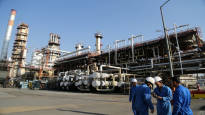According to the economist, the market quickly calmed down from the panic, because some kind of counterattack to Iran’s attack last week was expected.
Kaisa Uusitalo,
Antti Parviala
The effects of last night’s Israeli attack on the market seem to remain small. The night before Friday, Israel carried out an airstrike on Isfahan province in Iran.
The price of crude oil jumped up to five percent early in the morning after the attack and reached more than 90 dollars per barrel, but the rise was quickly reversed during the day. Towards evening, Brent crude oil cost around 87 euros per barrel.
In Asia, the stock markets closed down in the morning after the attack, and in Europe they opened slightly lower, but no major drops were seen throughout the day. In Helsinki, the general index finally ended up 0.7 percent plus.
OP’s leading economist Tomi Kortelan according to Friday, a typical market reaction was seen as risks rose.
– A relatively small but clear market reaction was seen as soon as the news of the strike came out: shares fell, the price of gold rose slightly, and the price of oil rose because the strike took place in an oil-producing area, says Kortela.
However, the market calmed down quickly because some kind of counterattack to Iran’s attack last week was expected.
In addition, last night’s strike was not large-scale but rather a warning, so the market reaction was also small for that reason, says Kortela. According to media reports, Iran is not planning an “immediate retaliatory attack on Israel” either.
However, the blow increases uncertainty and fear of a cycle of revenge.
If the conflict in the Middle East escalates and the price of oil rebounds quickly, it would be apt to accelerate inflation and postpone the interest rate cut by the European Central Bank (ECB). Currently, the ECB is expected to lower interest rates in June.
However, delaying the interest rate cut would require a much larger swing in the price of oil, Kortela estimates.
– We are probably talking about an increase of more than 10 percent, maybe even bigger. Then the ECB would have to think about whether it dares to lower interest rates in June or whether it will have to wait longer, says Kortela.
The price of oil rose at the beginning of the year
The tense situation in the Middle East has raised the price of oil since last fall. Since the beginning of the year, crude oil has become more expensive by about 17 percent, and the price level is the highest since the summer of 2022.
Last weekend, the price was raised by the Iranian drone attack on Israel, but the price fell again at the beginning of the week, when there were signs of appeasement in the air.
In addition to the situation in the Middle East, there are currently other uncertainty factors in the oil market, says a special transport expert Hanna Kalenoja From the automotive information center.
– Russian sanctions limit the access of Russian oil to the world market, and the United States has imposed sanctions on Venezuela’s oil industry. The market is now watching the situation with concern, he says.
is following the situation in this matter.
